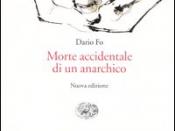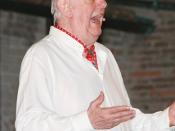Dario Fo uses situations to create comedy and reveal his political convictions, but the characters he creates can be just as integral to the purpose of the play. This is so for 'Accidental Death of an Anarchist' and 'Trumpets and Raspberries', where the use of the characters of the maniac and Agnelli respectively, the comedy and political undertones are effectively conveyed. Quite a major component of these plays, however does rely on situations and situational comedy for its momentum.
In 'Accidental Death of an Anarchist', the maniac is the chief device of farce and satire, and even slapstick. The maniac was created from classical origins from the template of the Jongleur. This character would hide behind the farcical, nonsensical mask of a fool and proceed to make scathing, satirical attacks on authority figures, with this mask as his protection. The projection of the mask makes him a device of comedy, while he is also able to reveal Fo's political convictions.
Through the maniac, Fo satirises the police. In the opening scene, the maniac burns papers in a police station which is suggestive of the reputation of the Italian Police for burning files and manipulating or destroying evidence. The combination of farce and satire in this character again reveals a great degree of incompetence in the police structure, and again the manipulation, when he convinces the police to rewrite their statement again. The re-enactment of the events surrounding the anarchist's death brought out huge discrepancies, showing the dishonesty which is present in the system.
The system is also revealed to be violent through slapstick, a situational form of comedy which is largely driven on by the maniac. The maniac slaps and kicks the police and has them falling over each other on numerous occasions, and despite being ridiculous, this stage violence echoes the violence inherent in the system. Through the case of the anarchist, the police justify their violent actions by stating that 'its just one of the tricks of the trade we police use to get our prisoner to confess', as though it were acceptable. The maniac then acts as the social voice saying 'that these methods' are cruel and unjust. Through the maniac this form of comedy and political expression is achieved, through a character both of Fo's ambitious are satisfied.
Finally in 'Accidental Death of an Anarchist', the maniac, through another situational device, mistaken identity. Fo creates the dramatic irony that he uses to satirise the class system. The dramatic irony comes when the audience knows that the judge to whom the police are cowarring is really the maniac, which creates the humour. Through this mistaken identity, someone, who comes of a class lower than the police officials in both wealth and status is able to adopt a power position on stage and by manipulating and ridiculing his social superior, creates a great shift in the power dynamics of the scene. This shift shows the audience how ludicrous the class system is, that it is built on ignorance and can be infiltrated by a man who is 'certified' as crazy.
The class system is ridiculed again in 'Trumpets and Raspberries' again through a character, Agnelli, who, rather than rise through the class system because of mistaken identity, falls right to the bottom of it. Agnelli is a business tycoon and profiteer of the oppressed working class and therefore capitalism, is suddenly swallowed up by it when he is given the name and face of the production line worker who saved his life, Antonio. Despite all of his business power, without his face and his memory he cannot be believed to be Agnelli. Fo uses a shift in power plays as well in that Antonio is aware of what is transpiring and in turn has the power of knowledge, and Agnelli who is mystified as to recent events is powerless. Through this situational humour, Fo creates the irony that Antonio's class, the working class is founded on ignorance, with the bourgeois claiming that if they don't educate the working class, they will not challenge authority. Fo has placed this character in a situation such that he can ridicule the capitalist regimes that he hates.
Fo also ridicules the police as well as doctors in 'Trumpets and Raspberries', which he does through situation, independent of character involvement. These characters are based entirely on farce, with the intention of revealing incompetence within power structures. Fo writes the doctor obsessed with suppositories, with Agnelli having suppositories for his coffee. The doctors with the medical capabilities to identify Agnelli through blood and tissue testing rely on the work of an insane spouse, who would claim any man as her husband so she could have one again. They then proceed after this identification to reconstruct the face of Antonio on Agnelli destroying the usual equation of plastic surgery with a rise in social status (which Fo also believes ridicules and so satirises).
Finally the doctor is able to be quoted to say 'Amputation is my favourite', which subtly introduces the idea of institutionalised violence with authority figures suggested to be sadists. The police are to be seen in quite the same way, with police brutality explored again in 'Trumpets and Raspberries', when they suggest that they would like to ' have one of these gadgets down at the nick', in reference to the meat grinder. They use the meat grinder as an implement of torture to persuade Antonio to confess to terrorism. This highly confronting image echoes the police brutality that actually exists when they suggest they have not so 'sophisticated methods' at the police station as the meat grinder for interrogation.
Fo uses both conventional characters, such as Agnelli and unconventional characters, the maniac, in unusual situations to create humour and reveal his political convictions. While often it is these situations which drive the comedy and politics, as in 'Trumpets and Raspberries', the character can be the primary driving force also as in Accidental Death of an Anarchist. Both characters and situations together create farce, satire and slapstick which reveals Fo's loathing of capitalism, power structures and the class system.




